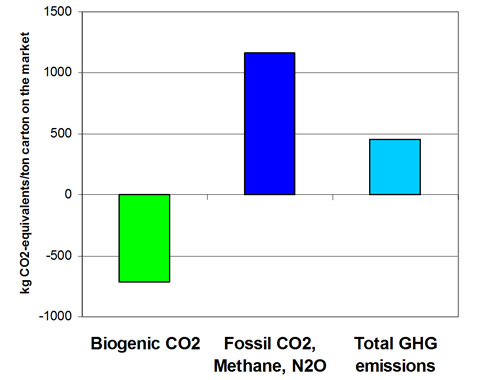|
Carbon sequestration in the forest is a major focus of the study. By relating the carbon benefits of the natural raw material (wood fibres from sustainably managed forests) to cartonboard packaging, the study presents both emissions of greenhouse gases and removals of carbon dioxide from the production and use of cartons – adding to the debate about climate change.
In a key conclusion, IVL suggests that due to demand for cartons from the market, 730 kg of biogenic carbon per average tonne of cartons in Europe is removed from the atmosphere through net sequestration in managed forests: -730 kg biogenic CO₂ / tonne cartons.
The IVL study complements the Pro Carton report which measured the amount of carbon dioxide equivalents emitted from fossil fuels used by the industry (cradle-to-gate) : a figure of 964 kg / tonne fossil CO2 equivalents emissions from an average tonne of cartonboard produced and converted.
There is currently no agreed way to include forest carbon in the carbon footprints of forest-derived products such as cartons, and this report significantly advances the on-going debate.
It proposes an assessment method for the net sequestration of biogenic CO₂ in the forests where roundwood used for cartonboard production is harvested. The study suggests a link between carton consumption and net carbon sequestration in sustainably managed forests : consumer demand for cartons stimulates demand for timber (wood fibre to make cartonboard) which in turn encourages the sustainable management of forests and carbon sequestration.
In addition to estimating the carton sequestration in forests associated with carton production in Europe, the study also presents a methodology for an EU27 scenario based assessment of end of life treatment and avoided emissions.
Accordingly, an average Carbon Footprint of converted cartons sold in Europe has been calculated by IVL, which represents the total Greenhouse Gas Emissions from one average tonne of virgin based fibres and recycled fibres produced, converted and printed in Europe.
The resulting Carbon Footprint is presented in a summary chart showing the net flows as CO₂ equivalents. (The delay of emissions according to PAS 2050 at use and in landfills are not included)
Description of carbon footprint
of 1 tonne of converted Carton
Given as GWP 100 |
|
GHG emission
(kg CO₂ / tonne
Carton) |
Biogenic CO₂
(kg CO₂ / tonne
Carton) |
|
|
|
|
Biogenic CO₂ net sequestration
in managed forests |
|
|
-730 |
|
|
|
|
GHG emissions from production
and transport of converted cartons |
|
964 |
|
Summary Cradle to Gate |
|
964 |
-730 |
|
|
|
|
Emissions associated with
end of life |
|
308 |
|
|
|
|
|
Summary Cradle to Grave |
|
1272 |
|
|
|
|
|
Avoided emissions from production
phase and end of life |
|
-145 |
|
Summary Cradle to Grave
including avoided emissions |
|
1127 |
-730 |
Source: IVL Report
In a cradle-to-gate approach, the figure of 964 kg/ tonne fossil CO₂e for the GHG emissions from production and transport of converted cartons and the figure of -730 kg biogenic CO₂ / tonne cartons for net sequestration of biogenic CO₂ , are significant.
These results proposed by IVL for the cradle-to - grave approach can be illustrated :

The IVL Swedish Environmental Research Institute report “Carbon Footprint of Cartons in Europe – Carbon Footprint methodology and biogenic carbon sequestration” by Elin Eriksson, Per-Erik Karlsson, Lisa Hallberg & Kristian Jelse was peer reviewed by NCASI (National Council for Air and Stream Improvement) and can be downloaded as a pdf from:
www.procarton.com
www.ecma.org
www.ivl.se
For further information, please contact:
Jennifer Buhaenko
Head of Public Affairs, Pro Carton
Buhaenko@procarton.com
Jan Cardon
Executive Director, ECMA
Jan.cardon@ecmabel.be
Elin Eriksson
Head of Department: Sustainable Organisations, Products and Processes
IVL Swedish Environmental Research Institute
Elin.Eriksson@ivl.se
|

